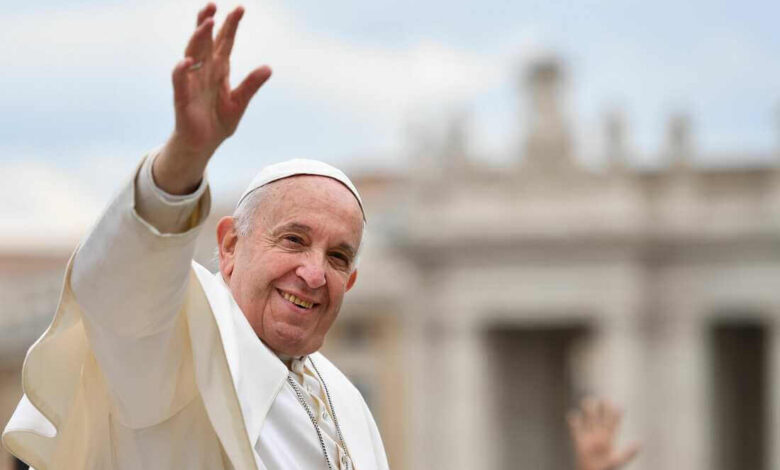The Life and Legacy of Pope Francis

Pope Francis, born Jorge Mario Bergoglio on December 17, 1936, in Buenos Aires, Argentina, is the 266th pope of the Roman Catholic Church. Elected in March 2013 following the resignation of Pope Benedict XVI, he is the first pope from the Americas, the first Jesuit pope, and the first non-European pope in over 1,200 years. Known for his humility, compassion, and focus on social justice, Pope Francis has significantly reshaped the image of the papacy in the 21st century.
Early Life and Religious Calling
Jorge Mario Bergoglio was born to Italian immigrants in Argentina. He studied chemistry before feeling the call to religious life and entered the Society of Jesus (Jesuits) in 1958. After years of rigorous theological and philosophical training, he was ordained a priest in 1969. He later became the Archbishop of Buenos Aires in 1998 and was made a cardinal by Pope John Paul II in 2001.
During his time in Argentina, he gained a reputation for humility, simple living, and dedication to the poor. He often rode the bus instead of using a private car and lived in a modest apartment rather than the archbishop’s palace.
Papacy and Reform
When Cardinal Bergoglio was elected pope in 2013, he chose the name “Francis” in honor of Saint Francis of Assisi, a symbol of poverty, humility, and peace. From the outset, Pope Francis set a tone of inclusivity, openness, and reform. His focus has been on a “poor Church for the poor,” calling attention to global inequality, environmental degradation, and the plight of migrants and refugees.
He has reformed the Vatican’s financial systems, tackled corruption within the Church, and worked to address the global clerical sexual abuse crisis. Although his reforms have not pleased everyone—drawing criticism from both progressives and conservatives—his efforts reflect a clear desire to modernize the Church while staying rooted in its core mission of love and service.
A Pope of the People
Pope Francis has redefined the papal image. He is often seen mingling with crowds, embracing the sick, and making phone calls to ordinary people. His papal encyclicals—Evangelii Gaudium, Laudato Si’, and Fratelli Tutti—highlight his deep concern for social justice, climate change, and global solidarity.
He has emphasized mercy over judgment, famously saying, “Who am I to judge?” when asked about LGBTQ+ individuals seeking God. His efforts to bridge gaps between religions, particularly through interfaith dialogue with Muslim and Jewish communities, have been historic and forward-looking.
Legacy and Impact
Pope Francis’s legacy is likely to be defined by his vision of a more inclusive, merciful, and action-oriented Church. His emphasis on pastoral care over dogma has opened doors for many who felt alienated by rigid traditions. While he hasn’t changed core doctrines, he has shifted the tone of the Church in ways that resonate with millions globally.
He is also widely recognized as a moral leader on issues such as climate change, economic inequality, and refugee rights, often speaking out on the world stage in ways few religious figures have dared.
Conclusion
Pope Francis stands as a transformative figure in the modern Catholic Church. Through his humility, compassion, and tireless advocacy for the marginalized, he has breathed new life into an ancient institution. Whether remembered as a revolutionary or a bridge-builder, his life and legacy will continue to inspire generations to come.
FAQs About Pope Francis
Q1: Who is Pope Francis?
A: Pope Francis, born Jorge Mario Bergoglio, is the 266th pope of the Roman Catholic Church. He became pope in 2013 and is the first pope from Latin America, the first Jesuit pope, and the first non-European pope in over 1,200 years.
Q2: When and where was Pope Francis born?
A: He was born on December 17, 1936, in Buenos Aires, Argentina.
Q3: What did Pope Francis do before becoming pope?
A: Before his papacy, he served as Archbishop of Buenos Aires and was later made a cardinal in 2001. He was known for his humility and advocacy for the poor.
Also Read: The Life and Legacy of Caroline Flack
Q4: Why did he choose the name “Francis”?
A: He chose the name in honor of Saint Francis of Assisi, reflecting his commitment to humility, peace, and care for the poor and the environment.
Q5: What are some of Pope Francis’s key teachings?
A: His teachings emphasize compassion, mercy, environmental responsibility, economic justice, and inclusion of marginalized groups.
Q6: What are some major documents written by Pope Francis?
A: Key documents include:
- Evangelii Gaudium (The Joy of the Gospel, 2013)
- Laudato Si’ (On Care for Our Common Home, 2015)
- Fratelli Tutti (On Fraternity and Social Friendship, 2020)
Q7: What reforms has Pope Francis made?
A: He has restructured Vatican finances, addressed clergy abuse scandals, simplified the annulment process, and promoted decentralization within the Church.
Q8: What is Pope Francis’s stance on climate change?
A: He strongly advocates for environmental protection, highlighting climate change as a moral issue in his encyclical Laudato Si’.
Q9: How has Pope Francis approached interfaith relations?
A: He has prioritized dialogue and reconciliation with other religions, especially Islam and Judaism, promoting peace and mutual respect.
Q10: Where does Pope Francis live?
A: Unlike his predecessors, he chose not to live in the lavish Apostolic Palace. Instead, he resides in a modest guesthouse within Vatican City called Casa Santa Marta.



